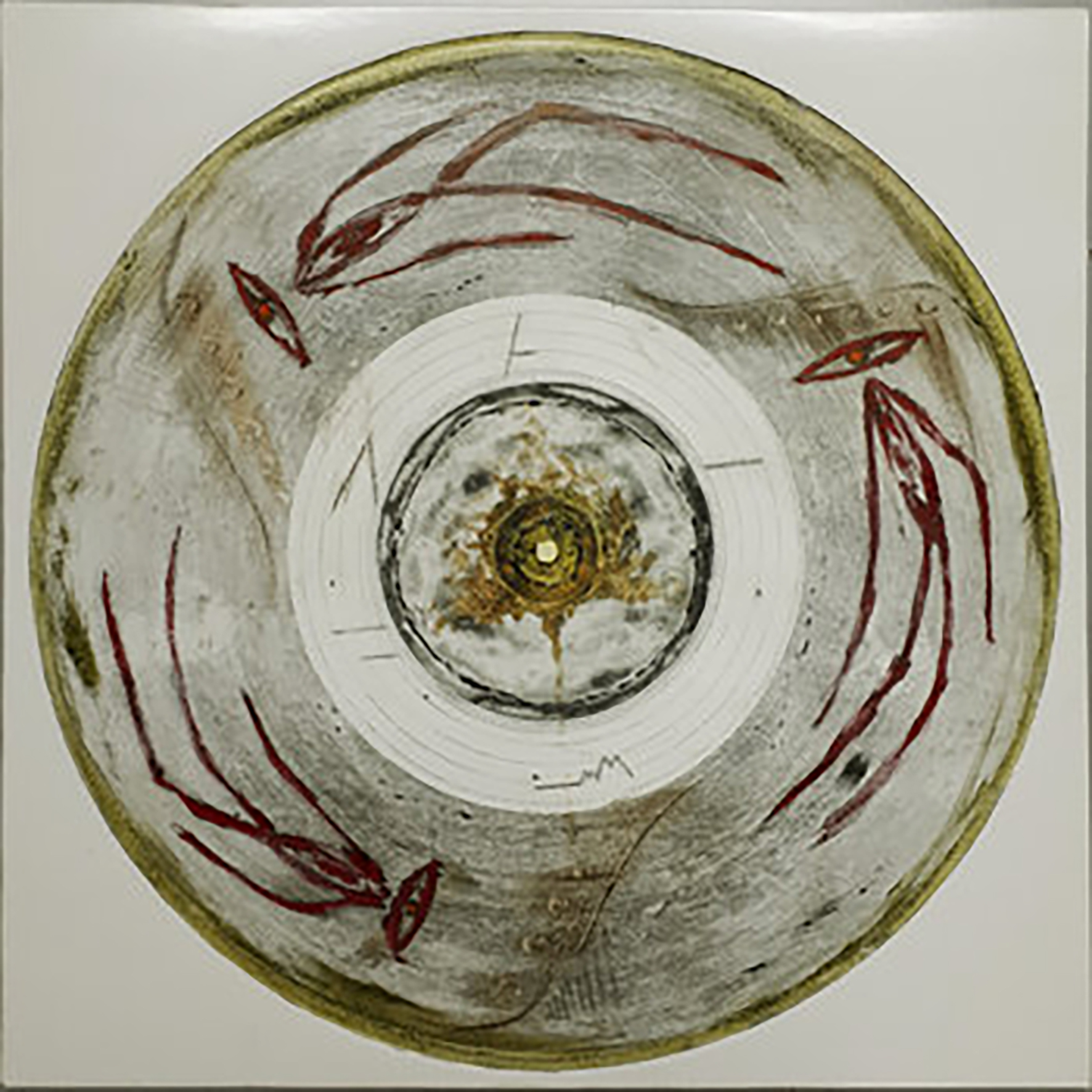My Cat is an Alien/Jean-Marc Montera, "Nuit d'Hiver"
 This latest release from the Opalio brothers documents their incendiary live performance with recurring collaborator Jean-Marc Montera at 2018’s Reevox-Nuit D’Hiver festival in Marseilles. Generally, live albums are not my preference (outside of iconic jazz line-ups), but the difference between a "live" and a "studio" recording is largely an irrelevant and purely academic one with My Cat is an Alien: both are completely spontaneous, so the only real difference is that people happened to be watching this time. Consequently, the primary appeal of Nuit d'Hiver lies in how Montera’s presence steers the brothers' signature psychedelia into somewhat wilder, more unpredictable territory. Admittedly, Montera is a recurring figure precisely because he has an especially deep understanding of the Opalios' vision and always brings welcome enhancements to it, so Nuit d'Hiver is still predicable in one sense: it is another strong addition to the MCIAA discography. It may not be quite as strikingly novel as some other MCIAA collaborations, given Montera's history and familiarity with the Opalios' work and ethos, but it is nevertheless a characteristically absorbing swirl of deep space lysergia.
This latest release from the Opalio brothers documents their incendiary live performance with recurring collaborator Jean-Marc Montera at 2018’s Reevox-Nuit D’Hiver festival in Marseilles. Generally, live albums are not my preference (outside of iconic jazz line-ups), but the difference between a "live" and a "studio" recording is largely an irrelevant and purely academic one with My Cat is an Alien: both are completely spontaneous, so the only real difference is that people happened to be watching this time. Consequently, the primary appeal of Nuit d'Hiver lies in how Montera’s presence steers the brothers' signature psychedelia into somewhat wilder, more unpredictable territory. Admittedly, Montera is a recurring figure precisely because he has an especially deep understanding of the Opalios' vision and always brings welcome enhancements to it, so Nuit d'Hiver is still predicable in one sense: it is another strong addition to the MCIAA discography. It may not be quite as strikingly novel as some other MCIAA collaborations, given Montera's history and familiarity with the Opalios' work and ethos, but it is nevertheless a characteristically absorbing swirl of deep space lysergia.
Opax Records/The End mAde RecordS
There are not many projects that consistently explore the outer reaches of abstract psychedelia as beautifully as My Cat is an Alien, but the Opalios are quite committed to both "spontaneous composition" and their small, but unique palette of tools.As such, a lot of MCIAA releases open in relatively familiar terrain (for them, at least) and this album is no exception, as "Nuit d'Hiver (part I)" begins with a repeating loop of sweeping laser noises.That structure soon dissolves into a diffuse fantasia of spacey electronics, then passes through some more minor evolutions before the bottom unexpectedly drops out to reveal an echoing vision of psychotic horror.That is the point where this album starts to blossom into something special and unique, as deep shudders, ghostly vocal haze, and hellish, creepy echoes swirl together in a nightmarish reverie.A few more fascinating stages follow, as the trio delve first into something akin to a fireworks display of vintage synth sounds erupting over deconstructed space rock, then into a passage of screeching feedback-like tones inside a cage of rattling metal strings.Somehow, the voyage only gets stranger and more wonderful from there, as there is an interlude that sounds like three great ‘70s psych/Krautrock albums being played onto top of each other, as well as the extremely unexpected appearance of a motif that resembles a lurching, slow-motion bass line.For a minute or two, it sounds exactly like mid-90s Tortoise turned up to do a real-time dub remix of the show, but the piece then plunges into something that briefly resembles a snarling, deconstructed, and deranged freak-out cover of Cabaret Voltaire’s "Project 80" sucked into a black hole.Then, for the finale, the trio unleash an escalating cacophony of layered noise, plinking metal, eerie buzzes, and some very unexpected wah-wah guitar.
The album's second half begins in quite different and quietly dreamlike fashion, as gently jangling strings mingle with a haze of spectral vocals.The strings soon cohere into an insistent pedal tone, however, and the piece fleetingly seems poised to erupt into a roiling space rock crescendo, yet unexpectedly collapses into abstraction instead.Later, a wonderfully heaving and shuddering undercurrent briefly feels like it is going to steer the piece into something heavy and rhythmic, but that too is abandoned as the trio continue to search for just the moment when everything organically clicks fully into place.That moment arguably comes shortly after 9-minute mark, as an insistently ringing guitar motif appears.Naturally, it soon gets overpowered by spaced-out electronic weirdness, but it does eventually crawl out from under that miasma again later.While that motif still never fully takes hold, the piece feels significantly more focused and purposeful from that point onward.At one point, the trio again threaten another dub-inflected excursion with some echoing thumps, yet that proves to be a feint before a surprise interlude of garbled radio transmission sounds.My personal high point of the piece comes when those shortwave radio-like sounds lock into a repeating loop that then curdles into dissonance.The remaining minutes offer a few more satisfying twists though, as the trio manage to sound like they are playing inside a reawakening volcano before everything falls away for a final "locked groove" motif.While the album's second half admittedly features more false starts than I would normally like, it ultimately becomes quite an impressive performance once it gets rolling.The crescendo is worth the wait.
Predictably, one of the album's primary pleasures lies in hearing how Montera handles being dropped into a scenario in which all conventional wisdom regarding rhythm, harmony, melody, and music theory has been rejected, which is a very tricky tightrope to walk in real-time.On the one hand, he would sound ridiculous if he started playing anything resembling "normal" chords or scales, but he also would not be adding much to the table if he just stomped pedals and made weird noises (there are already plenty of those on every MCIAA album).Consequently, some serious creativity is required and Montera proved himself to be admirably up to the task.Of the album's two sides, I definitely prefer the first, as it feels like all three artists shared the exact same vision and somehow nailed one spontaneously composed "set piece" after another.Both halves of the album deepened my appreciation of the Opalios' work, however, as I found myself noticing how essential Roberto's vocals are for evoking the project's disorientingly alien atmosphere (I have been recently fascinated by how dramatically the tone of a film scene changes when the soundtrack is changed or removed).I also noticed the newly named "Stereoalien Fidelity" aesthetic of "multi-dimensional, full dynamics-frequency spectrum" production in a few places, as sounds seemed to subtly move around my head when I listened with headphones (I like that).While the Opalios seem to be especially prolific these days, it does not seem like their standards are slipping at all, as Nuit d'Hiver is another solid and satisfying release that fitfully creeps into some appealing new terrain.It might not feel like an especially dramatic departure from some other MCIAA releases, but it does feel intense and uncharacteristically melodic enough to stand out regardless (and the rare moments when everything falls seamlessly and gloriously into place can be quite striking).
Samples can be found here.



